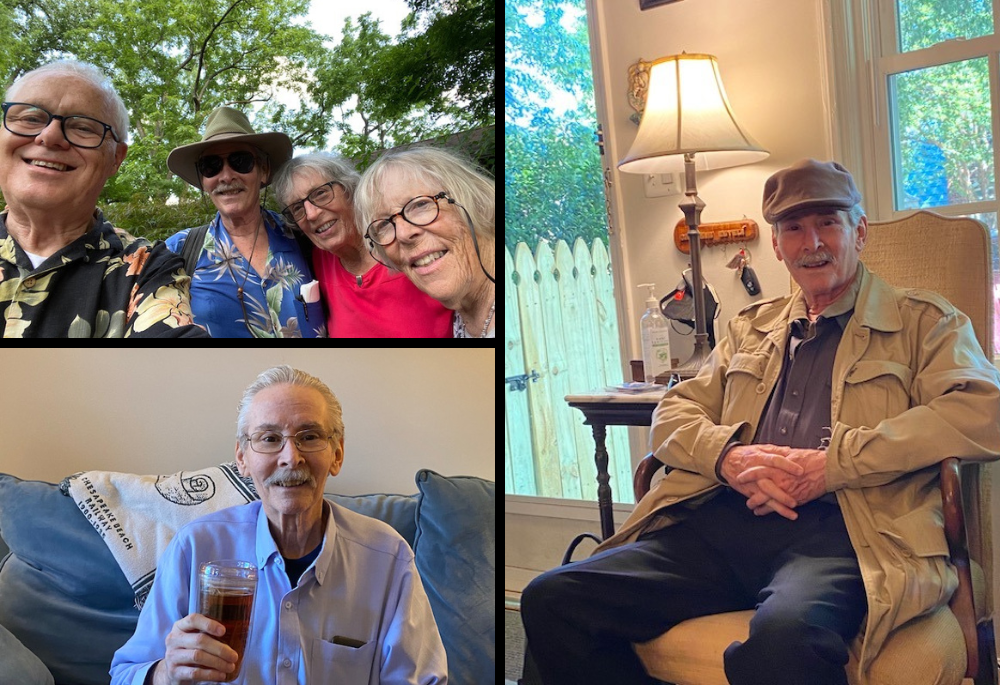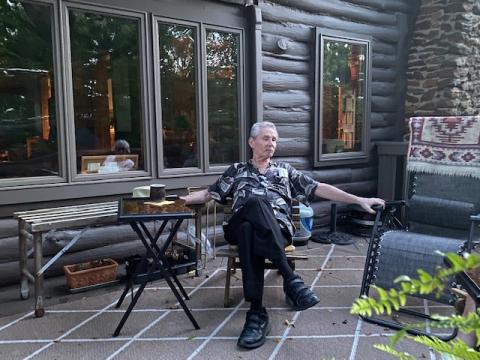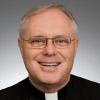
Clockwise, from top left: Peter Daly (left), José Luis Sánchez, and two friends, Jane Head and Nancy Smith; José Luis in a chair; and José Luis holding coffee on the couch at Peter's house (Courtesy of Peter Daly)
I haven't written anything for a long time because I have been busy as a caregiver. The last 18 months have been the "story of José Luis." It has been one of the most important chapters of my life.
In October of 2020, my friend José Luis Sánchez was having severe stomach troubles. He thought it might be colitis.
Toward the end of November 2020, I drove him home from his final colonoscopy. He looked positively ashen. As we drove to his apartment he told me, "It's cancer." Specifically, it was metastatic colon cancer that had spread from his colon to his liver and to one lung. The doctor had told him that the cancer was inoperable. The best he could hope for was to delay its progress with aggressive chemotherapy.
I was devastated. "I'm so sorry José," was about all I could say. José Luis was a retired librarian, a man of deep intellect but few words. He said stoically, "C'est la vie." But I could see tears running down his cheeks. We rode the rest of the way home in silence, holding hands.
José had lived on the third floor of a walk-up building in Washington, D.C., for 28 years. In the four years that I had known him, I had often seen him take the stairs two at a time, all the way to the third floor. But this time, he moved very slowly up the stairs. He collapsed on the second-floor landing, completely out of breath.
I sat down on the floor with him and put my arms around him. I said, "José you cannot live alone anymore. You have to come home with me." A couple of weeks later, on Dec. 8, I moved him to the guest room in my house with just some clothing, a few personal items, and a huge stack of books. José never went anywhere without a book. He was constantly reading in English and Spanish.
From Thanksgiving of 2020 until his death at the end of March in 2022 (just before Easter) I was José's caregiver, roommate and support system. It was the most intense period of love and loss in my life. It was a huge blessing.
Two things I want to say at the outset of this story.
First, José was a gay man. So am I. But we were not sexually involved. Our love was emotional and spiritual, not sexual. But nonetheless it was real love. In the course of our 16 months together, our relationship grew in intensity and complexity.
As a priest, I have often yearned for intimacy. We tell everyone that God is love. We tell people that the whole point of life is to love. But we seldom know the power and beauty and pain of love. Loving a group of parishioners is not the same as loving one other person. For me, as a priest, my friendship with José Luis was the deepest and richest experience of love that I ever had in my life. I think that it is something that most priests yearn for.
Second, José was a true and sincere seeker of spiritual truth. Like many gay people he was wounded and rejected by the Catholic Church. He was raised a Catholic in his native Puerto Rico, but in recent years he had rejected the church because he felt rejected by it.
As a priest, I have often yearned for intimacy. We tell everyone that God is love. We tell people that the whole point of life is to love. But we seldom know the power and beauty and pain of love.
For the past 20 years he had become a Unitarian and worshipped every Sunday at All Souls Unitarian Church in Washington. He liked their openness to spiritual exploration. He loved their respect for everyone's dignity. However, even though he had "left" the Catholic Church, he still had an attraction to the Eucharist and the Catholic liturgy, especially at holy days like Christmas and Easter.
José read more theology and Scripture than most priests. He explored the writings of Pope Francis. Occasionally he went to mass at the Dignity community in Washington, which is the LGBTQ community for Catholics and their friends and family. For years José was the coordinator of Dignity's lecture series.
He was also involved in Dignity's book club. That is how I met him. The book club was reading the novel that I had co-written with Msgr. Jack Myslinski, Strange Gods, a story of corruption and redemption in the church. José invited me to come speak to the club.
Despite his cultural roots, José was not a "Catholic in exile." He was not yearning for the church to take him back. He had moved on. His life was dedicated to spiritual growth and social justice. He helped All Souls to care for immigrants by translating for them. He spent his retirement serving the poor at soup kitchens and homeless programs in Washington. He was a much better person than I ever was, indeed, much better than most people. He was generous, kind, humble, thoughtful and selfless. He asked for nothing for himself and gave his few possessions away generously.
In the months that José lived at my house, we shared ordinary life. We ate our meals together. After dinner, we did the dishes and then sat on the couch holding hands as we watched TV. Sometimes I would massage his feet. He suffered from neuropathy. Sometimes I would lean on him. Sometimes, he would lean on me. At the end of the evening, we helped each other up the stairs. Me short of breath and José in pain.
He needed help in getting dressed for bed. I would take his shoes and socks off. It was a profound act of service. We usually would give each other a hug and kiss good night. Most nights we would remember to say, "I love you." For someone like me who had lived his adult life never hearing those words, it was an earthquake.
José loved classic opera. Many evenings we sat on the couch and watched YouTube videos of operas. After he died, I found a note he had written to himself. It said, "When I work, God respects me. When I sing, God loves me."

José Luis, sitting on a porch (Courtesy of Peter Daly)
José had sung at numerous recitals in Washington and community operas in New York. He was good. He sang the male leads in "Carmen" and "Pagliacci." With his advancing cancer, his singing days were over. But he loved to watch all the great arias. When the singers would hit the high notes, José Luis would cry uncontrollably. It hurt him that he could no longer sing.
Cancer is cruel, but it is not consistent. There are good days and bad days. After the initial shock of the diagnosis, there was hope that chemotherapy could work. In the first couple of months, we made ready for death, "getting affairs in order" with a will, health care directive, plans for cremation and a power of attorney. We had numerous trips to the clinic for blood tests, chemotherapy, blood clots, pain relief and to drain his abdomen. José never complained.
Sometimes I forgot about the diagnosis. Once I returned home and said to José, "How are you?" He looked at me and said, "I'm dying." It shocked me. Later that evening I asked him, "When death approaches, do you want to go into a nursing home or hospital?"
"No," he said. "I want to stay with you." We both cried.
For a while chemo worked. By March he had gained back 25 of the 40 pounds he had lost. The pain was less. The cancer markers were going in the right direction. There was hope. Some weeks last summer he returned to his apartment for two or three days at a time. It gave him a sense of normalcy and autonomy.
But by the fall the pain was back and getting worse. His appetite was poor; his weight falling. We knew it was bad, but we said nothing. His belly was terribly swollen by the fluid resulting from his failing liver. He looked pregnant. His clothes did not fit. He had to tie his pants up with a rope. I had to help him dress. When we went for his treatment, he tried to cover up everything with a huge overcoat. Always a meticulous dresser before the cancer, José now looked like a homeless man. Through it all he remained dignified and humble.

(Unsplash/Emerson Peters)
Neither of us was in good condition physically. We were both in our 70s. José had his cancer. I had a congestive heart failure, brought on by a failing aortic valve. Through Christmas and New Year, we tried to carry on, but we knew that we were just "whistling past the graveyard." My heart was getting worse. The doctors said that I would need to have my aortic valve replaced for a second time in 11 years. José said once, "Maybe we will go together."
The first week of March I had my heart operation. It was "minimally invasive," so my recovery was short. But I was gone nearly a week. During that week, the Dignity community organized volunteers to come and stay with José. He resisted this at first, but later realized it was necessary. For a whole week, he had round-the-clock volunteers to talk with, eat with and watch TV. Fifteen volunteers rotated through during that week. When I came back, I said to José, "See how you are loved!" I know it meant a lot to him.
One incident in mid-March let me know that the end was near. For several weeks, José was not sleeping well. I tried to listen for him in case he needed help. One night I heard him calling my name, "Peter, Peter!" I got up and found him standing in the hallway near the top of the stairs. He had urinated, and there was a little puddle at his feet. I changed him into dry clothes and got him back to bed.
Sitting on the side of the bed, I asked, "Why were you at the top of the stairs?"
He said, "I've got to figure out how to get home."
Advertisement
There was something childlike in his simple sentence. But I thought he might be disoriented, so I said, "José, you are home. This is your home now. You live here with me."
He said, "No, home."
"Do you mean to Harvard Street?" I asked, referring to his apartment.
"No," he said again more emphatically. "Home!"
"Do you mean Puerto Rico?" I asked. He shook his head no.
"Where?" I asked.
He raised his index finger and just pointed up.
I realized he meant heaven. I started sobbing and put my arms around him. "Oh, José Luis," I said, "you don't have to figure out how to go home. When the time comes, God will send a legion of angels to lead you home." I lay down next to him and held him until he slept.
He died about two weeks later. By the end of March José could no longer walk and he could hardly speak. He was going blind. His beautiful voice was still. Hospice came to help. I learned to administer morphine. It was frightening.
Dear friends came to stay with us in the last week. Two of them were nurses. It was a huge help. I couldn't lift him or change him by myself. They knew what to do.
José died on Sunday, at about 1 p.m. The final few hours I sat by his bed, holding his hand. Our friends were downstairs, but they left us alone. It was a grace. I sang some hymns as his breathing grew shallower: "Swing Low Sweet Chariot," "Abide With Me," and "All Creatures of Our God and King." I stroked his brow and put a little sponge with water in his mouth. He looked at me, but I was not sure if he could see me. But he could hear me saying over and over again, "I love you, José."
One of the last verses of "All Creatures of Our God and King" is about death:
And you, most kind and gentle death,
Waiting to hush our final breath,
Oh, praise him! Alleluia!
You lead to heaven the child of God,
Where Christ our Lord the way has trod.
Oh, praise him, Alleluia!
Just as I sang the final "Alleluia," José Luis looked my way, let out a sigh and breathed his last. I leaned over the bed rail, held his lifeless body and sobbed.
The 16 months with José Luis in my house were a pure grace. They were the antidote to the loneliness and the wound of celibacy. José gave me the great gift of saying, "I love you." I learned to say it back. Love is love.
I am not alone in this view.
Why did I write all this? First to pay tribute to my friend José Luis. He deserves to be remembered. Second, I feel the need to be honest about myself. In my 72nd year I need to live with integrity. If not now, when?
Cardinal Jean-Claude Hollerich of Luxembourg, the head of the Commission of the Bishops' Conferences of the European Union, agrees with me. In January of 2022, in an interview with Germany's Catholic News Agency, or KNA, he said that the church's assessment of all homosexuality relationships as sinful is wrong. "I believe that the sociological-scientific foundation of this teaching is no longer correct," Hollerich said. The cardinal went on to say that it is time for a fundamental revision of church teaching on homosexuality.
I hope that what the cardinal suggested comes true. Someday the Catholic Church will realize that it is wrong about same-sex love, which can be no less meaningful or Christian than heterosexual love.
Why did I write all this? First to pay tribute to my friend José Luis. He deserves to be remembered. Second, I feel the need to be honest about myself. In my 72nd year I need to live with integrity. If not now, when?
I have lived the life that the church has asked of me. I always took my vow of celibacy seriously and I always endeavored to live a chaste life. I was not breaking my commitments behind the scenes. But I have changed in the last 40 years. So has the church. So has the world. People now value honesty and authenticity. I am not the only priest with these struggles.
These days I sit on the sofa alone. José's place in the middle of the sofa remains empty. I remember holding his hand, rubbing his feet and leaning on his shoulder. I remember wrapping him up in a down comforter and putting a hot water bottle on his feet when his chemotherapy left him shivering. Now I put the recordings of José singing his favorite arias on the CD player. I hear his voice in the house again.
Our relationship was all a gift. It was a grace. Our love was good. José Luis was good.
And I'm sure that he didn't have any trouble finding his way home.








